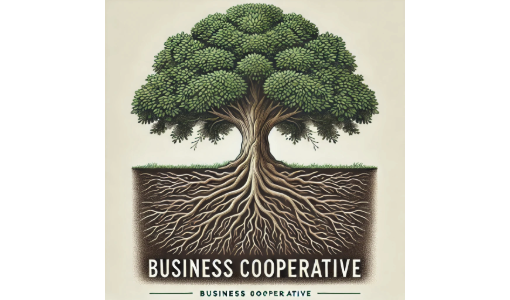SUMMARY An ideal image to describe a business cooperative would depict a diverse group of individuals working together collaboratively. This could include people sitting around a table engaged in a discussion, working together on a project, or participating in a democratic vote. The setting should convey a sense of equality and shared purpose, highlighting the cooperative’s focus on member involvement and mutual benefit. Additionally, elements like charts, documents, and laptops can signify the business aspect, while the interaction among people reflects the cooperative spirit.
Understanding Business Co-Ops: Structure, Benefits, and Financial Pitfalls
Business cooperatives, or co-ops, present a unique model of enterprise that prioritizes mutual benefit over individual profit. A business co-op is a business organization owned and operated by a group of individuals who share a common goal. These organizations are built on the principles of member ownership, democratic control, member benefit, equitable contribution, and autonomy. Unlike traditional businesses, co-ops aim to serve their members’ needs, whether through better prices, enhanced services, or profit-sharing mechanisms. However, like any business model, co-ops face several financial challenges. Here, we explore common financial pitfalls and provide best practices to mitigate these issues.
Insufficient Capital
One of the most significant challenges co-ops face is raising sufficient capital. Co-ops typically rely on member contributions and may find it difficult to access external financing. To combat this, co-ops should diversify their funding sources. Seeking grants, loans, and investments from ethical investors can provide the necessary financial boost. Additionally, implementing a robust financial plan and maintaining transparent communication with members about financial needs and the benefits of additional contributions can help ensure adequate capitalization.
Poor Financial Management
Effective financial management is crucial for the sustainability of any business. Co-ops are no exception. Poor financial management can lead to cash flow problems, mismanagement of funds, and decreased profitability. To address this, co-ops should invest in financial training for their management team and consider employing or consulting with experienced financial professionals. Implementing strict financial controls, conducting regular audits, and utilizing accounting software can improve accuracy and transparency in financial reporting.
Inefficient Operations
The democratic nature of co-ops, while a strength, can also lead to inefficient operations due to slower decision-making processes. To balance this, co-ops should establish clear governance structures and decision-making processes. Empowering a management team to make day-to-day operational decisions within a strategic framework agreed upon by members can help streamline operations and maintain agility.
Member Apathy
Active member involvement is critical to the success of a co-op. However, lack of interest or participation from members can lead to poor decision-making and reduced financial performance. To counteract member apathy, co-ops should foster a strong community spirit by regularly engaging members through meetings, surveys, and updates. Offering incentives for participation and creating roles or committees for members to take on responsibilities can also boost engagement and commitment.
Market Competition
Competing with larger, traditional businesses can be a daunting task for co-ops. To thrive, co-ops should focus on their unique value propositions, such as member benefits and community orientation, to differentiate themselves. Investing in market research, marketing strategies, and partnerships can enhance their competitive edge. Additionally, continuously innovating their products and services to meet market demands is essential.
Over-Reliance on Member Participation
While member participation is fundamental to the co-op model, over-reliance on members for management can be problematic if they lack necessary skills. Co-ops should provide training and development opportunities for members and consider hiring professional managers and staff with the required expertise. This approach ensures efficient operations while maintaining member oversight and involvement.
Conflict Among Members
Disagreements among members can disrupt operations and affect financial stability. Establishing clear conflict resolution mechanisms and fostering a culture of open communication and collaboration can help manage and resolve disputes. Regularly updating and agreeing on the co-op’s strategic direction ensures alignment and reduces potential conflicts.
Lack of Professional Expertise
Access to professional expertise is crucial for efficient operations and financial health. Co-ops should consider hiring or consulting with experts in finance, marketing, and management. Offering professional development for members and staff can build internal capabilities. Leveraging networks and partnerships with other organizations can provide additional support and resources.
Regulatory and Compliance Issues
Navigating the regulatory environment can be complex, and non-compliance can result in financial penalties. Co-ops should stay informed about relevant regulations and ensure compliance through regular audits and consultations with legal experts. Developing a compliance program and training staff on regulatory requirements can prevent costly legal issues.
Economic Downturns
Like any business, co-ops are vulnerable to economic downturns which can impact their financial health. To build resilience, co-ops should maintain a financial reserve and diversify their income streams. Implementing flexible business models that can adapt to changing economic conditions and continuously monitoring economic trends can help co-ops navigate downturns more effectively.
Business co-ops offer a unique and collaborative approach to business, they must navigate several financial challenges to thrive. By understanding these pitfalls and implementing best practices for remediation, co-ops can ensure their sustainability and continue to provide significant benefits to their members.

